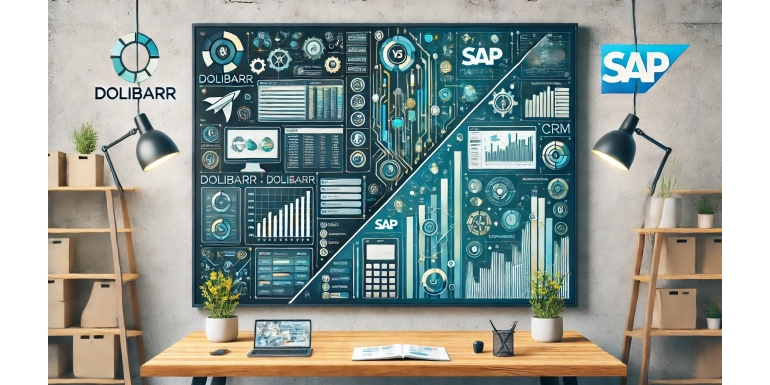
Introduction
Choosing an ERP (Enterprise Resource Planning) software is a crucial step for any company looking to optimize its management and internal processes. Among the many available solutions, Dolibarr and SAP are among the most popular, but they cater to very different types of businesses. Dolibarr is an open-source and accessible solution, while SAP is a giant in the ERP sector, mainly used by large enterprises.
In this article, we will compare these two solutions in detail, covering their features, cost, accessibility, as well as their advantages and disadvantages, to help you choose the best solution for your business.
1. Overview of Both Solutions
1.1. Dolibarr: A Flexible and Accessible Open-Source ERP & CRM
Dolibarr is an open-source ERP & CRM designed to meet the needs of small businesses, SMEs, and self-employed entrepreneurs. Its main advantage is its ease of use and modularity. Dolibarr allows companies to manage their clients, quotes, invoices, inventory, projects, and much more through an intuitive and scalable interface.
Key Features of Dolibarr:
-
Customer and prospect management (CRM)
-
Invoicing and accounting
-
Inventory and purchase management
-
Project and task management
-
Human resources and leave management
-
Customizable and extensible modules
1.2. SAP: A Leading ERP for Large Enterprises
SAP is one of the world's leading ERP solutions. It is primarily designed for large companies and multinational corporations that require complex and integrated business process management. SAP offers a wide range of solutions tailored to various industries, but its high cost and complexity make it less accessible to smaller businesses.
Key Features of SAP:
-
Advanced financial management and accounting
-
Human resources management
-
Supply chain management
-
Procurement and supplier management
-
Business intelligence and data analytics
-
Integration with other complex systems
2. Feature Comparison
2.1. Accessibility and Ease of Use
-
Dolibarr is known for its simple and intuitive interface. It does not require extensive training and can be installed on a local server or online with just a few clicks.
-
SAP, on the other hand, is much more complex to use and typically requires advanced training. Its implementation takes longer and may require the assistance of specialized consultants.
2.2. Cost and Business Model
-
Dolibarr is an open-source solution, meaning it is free in its base version. Businesses can purchase additional modules based on their needs, making it a very cost-effective option.
-
SAP is a proprietary solution with very high acquisition and maintenance costs. Licenses, implementation, and technical support can represent a significant investment for a company.
2.3. Modularity and Scalability
-
Dolibarr allows for extensive customization thanks to its ecosystem of modules and extensions. Businesses can activate only the necessary features and add new modules as they grow.
-
SAP offers a complete and integrated suite, but its customization is often more complex and requires specific developments.
2.4. Data Management and Compatibility
-
Dolibarr provides a lightweight and flexible solution with export and integration options suitable for SMEs.
-
SAP integrates powerful data analysis and advanced reporting tools, but these features are often too complex for small businesses.
3. Advantages and Disadvantages
| Criteria | Dolibarr | SAP |
|---|---|---|
| Cost | ✅ Free (open-source) with paid modules | ❌ Very expensive (licenses, maintenance, training) |
| Ease of Use | ✅ Intuitive interface, easy to learn | ❌ Complex, requires advanced training |
| Installation | ✅ Quick and simple | ❌ Lengthy and requires consultants |
| Modularity | ✅ Customizable with many modules | ❌ More rigid and costly customization |
| Suitability | ✅ Ideal for small and medium businesses | ❌ Better suited for large enterprises |
| Advanced Features | ❌ Less focused on data analytics | ✅ Powerful analytics and reporting tools |
| Support and Assistance | ✅ Active community and free forums | ❌ Paid support and expensive technical assistance |
4. Which One is Best for Your Business?
4.1. Dolibarr: The Ideal Choice for SMEs
If you are a small or medium business or a self-employed entrepreneur, Dolibarr is the best fit. Its ease of use, low cost, and modularity make it an excellent tool for day-to-day business management without requiring heavy investments.
You should choose Dolibarr if:
-
You are looking for a simple and cost-effective solution.
-
You want a quick installation without technical complexity.
-
You need modular and scalable management.
-
You prefer an open-source solution with an active community.
4.2. SAP: A Solution for Large Enterprises
SAP is particularly recommended for large enterprises and multinational corporations that have complex business management needs and a substantial budget for digital transformation.
You should choose SAP if:
-
You are a large enterprise with complex business processes.
-
You need integrated and centralized management.
-
You have a large budget for implementation and maintenance.
-
You require advanced business intelligence and reporting tools.
Conclusion
The choice between Dolibarr and SAP primarily depends on the size and needs of your business. If you are a small or medium business looking for an affordable and easy-to-use solution, Dolibarr is undoubtedly the best choice. However, if you are a large company requiring complex integration and advanced features, SAP will be more suitable.
In any case, it is important to analyze your needs before making a decision to choose the solution that will offer the best efficiency and profitability for your company. So, Dolibarr or SAP? The choice is yours based on your business goals!
